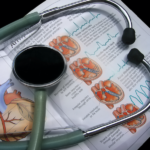Cardiovascular disease is an illness of the blood vessels and the heart itself. Heart disease can present in many different forms.
Cardiovascular disease can consist of:
Heart Failure (Congestive heart failure) While this doesn’t mean the heart stops beating it is a scary phrase to hear from your doctor. It means that the blood isn’t able to pump as well as it should. The heart has to keep working harder and harder to meet the body’s blood and oxygen needs. It can get progressively worse if left untreated.
Heart Valve Problems (Stenosis) – The heart valves don’t open and close enough to allow proper blood flow. This is particularly dangerous to the health of your heart and your overall wellbeing.
Arrhythmia – the Abnormal beating of the heart. It can beat too slowly, too fast or off rhythm. Arrhythmia can affect how efficiently the heart is able to work. It can cause palpitations and lead to stress and adrenal fatigue as well as other health problems such as anxiety.
Atherosclerosis -Atherosclerosis is a condition where plaque develops and builds up inside of the artery walls. It makes the passageways more narrow and blood flow becomes constricted. It makes it far more difficult for your heart muscle to be productive and wears it down over time.
When your heart function fully or properly it can leave you feeling exhausted, weak, and often dealing with chest pains. If left untreated cardiovascular disease often leads to heart attacks and or strokes in patients.
If you are in or near the Tampa, Florida area we would love to work with you to get your health on track and you on your way to the best most productive healthy life you can live. Give Tampa Cardiovascular Associates a call today at 813-975-2800 or visit us online at www.tampacardio.com.





